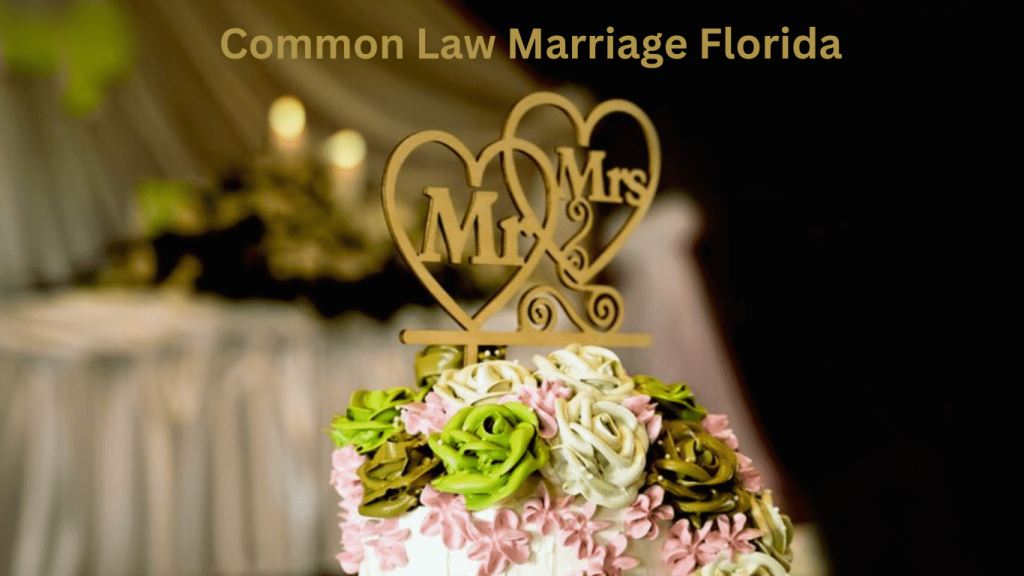In Florida, the concept of common law marriage often leads to misunderstandings, leaving many couples uncertain about their legal status. Since common law marriage in Florida was abolished in 1968, couples living together without a formal marriage do not automatically acquire the legal rights afforded to married spouses. This includes property division, inheritance, and medical decision-making authority.
Despite this, various myths persist, such as the incorrect belief that living together for seven years equates to a legal marriage. While Florida does not recognize new common law marriages, it honors valid unions established in states where common law marriage is legal. Couples can protect their rights through tools like cohabitation agreements, wills, and healthcare surrogacy documents, ensuring both partners are legally safeguarded in their relationship.
What is Common Law Marriage?
A common law marriage in florida occurs when a couple lives together for a period of time, holds themselves out as married, and maintains a public reputation as spouses, all without a formal marriage ceremony or obtaining a marriage license. This type of marriage is recognized in certain states, though the specific requirements for a valid common law marriage can differ widely.
In some jurisdictions, the couple must live together for a certain number of years, agree to be married, and present themselves as married to the public. However, not all states recognize common law marriages, and those that do may only recognize unions that were established before a specific date. It’s important to understand that common law marriage laws vary greatly, and individuals should seek legal advice in their state to understand their rights and obligations.
Does Florida Recognize Common Law Marriages?
Florida does not permit the formation of new common law marriages, as they have been prohibited by law since 1968. This means that couples living together in Florida cannot establish a marital relationship without obtaining a marriage license and going through a formal ceremony. However, Florida does recognize common law marriages that were legally established in states where such unions are valid. For instance, if a couple entered a common law marriage in a state that allows it and then moved to Florida, their marriage would be honored and treated as legally binding. This recognition ensures consistency and legal protections for couples relocating to Florida while emphasizing the state’s preference for formalized marriage agreements. Couples should understand these laws to avoid confusion about their marital status and rights.
Are You Legally Married After Living Together for Seven Years in Florida?
A persistent myth is that living together for seven years automatically creates a common law marriage. But is common law marriage legal in Florida under these circumstances? No, it is not. Cohabitation, regardless of duration, does not constitute marriage in Florida unless it meets the criteria of a common law marriage established in a state where such unions are recognized.
Changes in Florida’s Marriage Laws
Florida’s decision to prohibit the formation of new common law marriages in 1968 reflects a broader legal trend emphasizing the need for formalized marriages. This shift aims to ensure clarity in the legal rights and responsibilities of couples, particularly concerning property ownership, inheritance, and parental rights. By requiring a marriage license and formal ceremony, Florida eliminates ambiguities that can arise in common law unions, providing a more straightforward legal framework for addressing marital disputes.
While some states still recognize common law marriages, Florida’s stance underscores the importance of official documentation for securing marriage-related benefits, such as spousal rights in healthcare, taxes, and inheritance. The change also highlights the state’s efforts to reduce legal complexities and conflicts that may arise when cohabiting partners separate. For couples in Florida, this means prioritizing formal registration to protect their legal and financial interests.
Alternatives to Common Law Marriage in Florida
Couples in Florida can protect their rights through legal alternatives like cohabitation agreements. These binding documents define property, finances, and asset distribution. They offer security and clarity not provided by common law in Florida.
Additionally, unmarried couples can use tools like wills, living trusts, and healthcare proxies to ensure their rights are respected in situations such as medical emergencies or inheritance matters. Joint property ownership and beneficiary designations for life insurance or retirement accounts can further safeguard financial interests. These measures allow couples to customize their legal and financial arrangements, ensuring that their partnership is protected without the need for a formal marriage license or ceremony.
Criteria for Recognition of Out-of-State Common Law Marriages in Florida
Is Florida a common law marriage state? While Florida does not allow common law marriages to be established, it respects those legally formed elsewhere. To have your out-of-state common law marriage recognized, it must meet the following criteria:
- You both had the legal capacity to marry.
- There was mutual consent to enter a marital relationship.
- You cohabited and publicly presented yourselves as married.
Unmarried Couples’ Rights in Florida
In Florida, unmarried couples do not have the same legal protections as married couples. Without common law marriage recognition, cohabitation alone does not grant rights such as inheritance, property division, or spousal privileges. Unmarried couples must take proactive steps to protect their interests.
Legal tools like wills, powers of attorney, and beneficiary designations are essential for unmarried couples. Wills ensure inheritance, while powers of attorney grant authority for healthcare and financial decisions. Beneficiary designations on life insurance, retirement, and bank accounts ensure that partners are legally entitled to inherit assets.
Cohabitation Rights and Protections
Cohabitation does not provide the same rights as marriage under Florida law. To protect themselves, couples can draft agreements addressing property division, healthcare decisions, and financial obligations. These documents ensure clarity and legal standing in case of disputes.
Property Rights and Health Insurance
Unlike formally married couples, unmarried partners do not share automatic property rights or access to health insurance benefits. Using tools like joint ownership agreements, trusts, and healthcare proxies can help bridge this gap.
Alimony and Child Support
Does the state recognize the florida common law marriage for purposes of alimony or child support? Not directly. However, if children are involved, Florida law ensures that both parents contribute financially, regardless of marital status.
Common Misconceptions and Legal Myths
There are several common misconceptions and legal myths surrounding common law marriage in Florida that often lead to confusion for cohabiting couples. One widespread myth is that simply living together for a certain period of time automatically creates a common law marriage. However, this is not the case in Florida. The state does not recognize common law marriage, regardless of how long a couple has been cohabiting. Cohabitation alone does not grant marriage rights or legal benefits in Florida, even if the couple has lived together for many years.
Another misconception is the belief that living together for a set number of years, often quoted as seven, automatically results in marriage status. While some states may have different rules for common law marriages, Florida does not follow this approach. The length of time a couple cohabits has no bearing on whether they are legally considered married under Florida law.
Common law marriage is not legal in Florida unless it was validly established in another state. Florida honors such marriages from other states but does not allow them to be formed locally. Couples should understand these laws and seek legal advice to avoid misunderstandings..
Clarifying Legal Cohabitation Misunderstandings
Looking the difference between cohabitation and marriage is crucial for couples sharing a household. Many cohabiting couples mistakenly believe they have the same legal rights as married partners, but this is often not the case.”Common law marriage” myths often cause misunderstandings, especially in states like Florida, where such laws are limited.To avoid potential disputes and protect their interests, cohabiting couples should seek professional legal advice. Gaining clarity on the legal implications of their living arrangements can ensure they make informed decisions and safeguard their rights.
Conclusion
Florida does not allow new common law marriages but recognizes those legally established in other states. Common law marriages from valid states are treated as legally binding in Florida. However, cohabitation alone does not provide the same legal protections as marriage. Couples in Florida must formalize their marriage to secure legal rights. Understanding this distinction is essential for protecting their interests.
Given this, couples in Florida should consider utilizing legal agreements to safeguard their rights and responsibilities. Cohabitation agreements, wills, powers of attorney, and beneficiary designations help protect unmarried partners by clarifying property, medical, and inheritance matters. Understanding common law marriage and using legal tools ensures informed decisions and avoids legal issues.
FAQs
1. Does Florida have common law marriage?
No, Florida does not permit the formation of new common law marriages.
2. Is Florida a common law marriage state?
Florida does not recognize common law marriages established within the state but honors those legally formed in other states.
3. What rights do unmarried couples have in Florida?
Unmarried couples can establish rights through legal agreements like cohabitation agreements, wills, and healthcare proxies.
4. Does the state of Florida recognize common law marriage from other states?
People often misunderstand because of myths about “common law marriage,” especially in states like Florida, where such laws are limited.
5. How can unmarried couples protect their rights in Florida?
Legal tools such as cohabitation agreements, property agreements, and beneficiary designations can help unmarried couples secure their rights.



